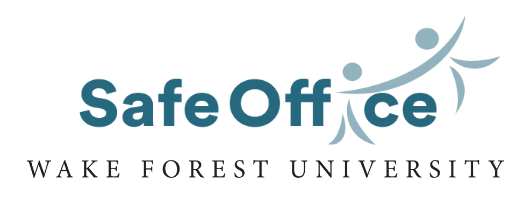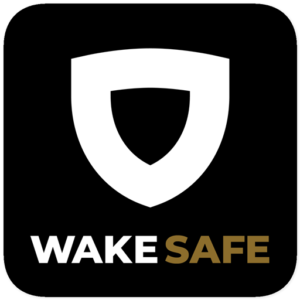As a faculty or staff member, you may be a safe and trusted adult in the lives of students at Wake Forest University, who may intentionally or unintentionally share experiences of interpersonal violence with you. For survivors, having support is essential. If a student discloses that they have experienced interpersonal violence (such as dating/relationship violence, sexual harassment, sexual misconduct, sexual assault, or stalking) it is important to check if the student currently feels safe, provide non-judgmental support, and provide referrals to confidential resources that are available.
Responding to Disclosures of IPV
If a student discloses a concern related to interpersonal violence, remember: STOP, DROP, & ROLL! Click each bullet below to learn more.
Stop
…for safety. Ensure that the student is safe in the moment. If there are imminent concerns for safety, call University Police at 336.758.5911. If the student needs immediate medical care contact Deacon Health at 336.758.5218. Inform the student of your mandated reporting duties so the student has autonomy over whether or not they want to share information that may have to be reported.
Drop
…assumptions and judgment. Provide validation to the student and believe what they are telling you. Don’t question behaviors or choices shared during the disclosure. Acknowledge that reaching out is hard and you are here to support the student.
Roll
…to resources. Help the student know what resources are available to them and how to access them. When in doubt – Start with Safe and call us at 336.758.5285.
Know Your Mandated Reporting Duties
Determine if you are considered a mandatory reporter through Wake Forest and learn more about mandatory reporting policies by viewing the Title IX & Non-Title IX Sexual Misconduct Policy – section 1.03- Reporting & period of limitations.
Know Your Confidential Campus Resources
Review our list of confidential vs. non-confidential resources and reporting options by visiting our Campus Resources page.
Seek Consultation If You Have Questions
Receiving disclosures of interpersonal violence can be overwhelming at times. If you have questions about next steps to take, call the Safe Office for a phone, Zoom, or in person consultation at 336.758.5285.
Follow Trauma-Informed Practices in the Classroom
Trauma-informed practices in the classroom help to foster increased psychological safety, which in turn improves academic performance. The Safe Office recommends the following:

Need to leave the website quickly?
Safe Office
Need immediate assistance?
24/7 Confidential Support Line
Have a non-urgent question?
Visit Us!
Wake Safe App

- Mobile BlueLight: send your location to and call WFU PD simultaneously.
- Friend Walk: sends your location in real-time to a friend so they can watch you as you walk to your destination!
- Social Escape: allows you to get out of a tough social situation by calling you and giving you an excuse to leave.
- We Are Wake: a comprehensive call to care for the mental health of all students.
- Campus Support Resources
Include Language Advocating For Healthy Sexual Conduct In Your Syllabus
Below are two options for text you can include in your syllabus to provide students information on support and resources related to interpersonal violence. Feel free to directly copy/paste:
The Wake Forest University Safe Office provides confidential support for interpersonal violence (which may include dating/relationship violence, sexual harassment, sexual misconduct, sexual assault, or stalking). The Safe Office also provides information on reporting options, advocacy, accompaniment, counseling, and assistance with academic accommodation requests. Reach the Safe Office 24/7 by phone at 336.758.5285. For non-urgent concerns, email at safe@wfu.edu. Learn more by visiting their website at safeoffice.wfu.edu
Wake Forest University is committed to fostering a safe, productive learning environment. University policies prohibit gender discrimination and interpersonal violence (which may include dating/relationship violence, sexual harassment, sexual misconduct, sexual assault, and stalking).
We understand that instances of interpersonal violence can undermine students’ academic success. We encourage students who have experienced some form of interpersonal violence to talk to someone about their experience so they can get the support, understanding their rights and options, and feel empowered to heal.
The Wake Forest University Safe Office provides confidential support to survivors of interpersonal violence (including dating/relationship violence, sexual harassment, sexual misconduct, sexual assault, and stalking). The Safe Office also provides information on reporting options, advocacy, accompaniment, counseling, and assistance with academic accommodation requests. Reach the Safe Office 24/7 by phone at 336.758.5285. For non-urgent concerns, email at safe@wfu.edu. Learn more by visiting their website at safeoffice.wfu.edu
Alleged sexual harassment or misconduct can be reported to the Title IX Office (a non-confidential resource) by completing a report on the Title IX website. The Student Sexual Harassment and Sexual Misconduct Policy may be reviewed by visiting the Title IX website at https://titleix.wfu.edu/. For more information, you may call the Title IX office at 336-758-7258.
Alleged criminal conduct may also be reported to law enforcement by calling University Police at 336.758.5911 or by submitting a silent witness report at https://police.wfu.edu/forms/silent-witness-form/
Don’t Forget To Care For Yourself
Unfortunately, faculty and staff members may also have personal experiences with interpersonal violence that can be triggered upon learning about a student’s experience. The Safe Office encourages faculty and staff to be compassionate to themselves, engage in healthy self-care, and seek professional support for yourself if needed. Students shouldn’t have to be alone on their journey towards healing, and neither should you.
- Recommended resources:
- WFU Employee Assistance Program
- Available to all full time faculty and staff (and their families)
- Family Services
- Forsyth County community resource providing emergency support, safety planning, sheltering, advocacy, and counseling for survivors of interpersonal violence.
- RAINN
- Rape, Abuse, & Incest National Network (RAINN) website with 24/7 hotline and live chat
- Resource guide for coping with secondary trauma
- WFU Employee Assistance Program
